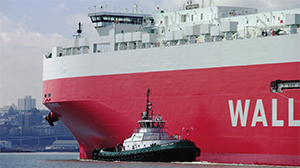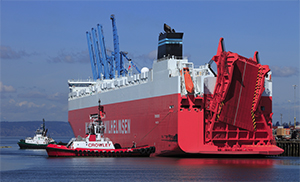A ruling by the Federal Maritime Commission (FMC) that allows a group of foreign roll-on/roll-off carriers to jointly negotiate and contract for U.S. tugboat services has alarmed the industry.
The commission voted 4-1 in January to permit four companies in a shipping alliance to negotiate as a group and sign joint contracts with individual U.S. tug operators. It is an amendment to a cooperative working agreement already approved by the commission. Prior to the amendment, the parties were required to negotiate separately for tug services.
Commissioner William Doyle was the sole member of the panel who opposed the amendment. He said that the ruling gives too much negotiating power to the shipping companies and will harm the industry.
“Allowing this group of foreign-flag ro-ro carriers to use their collective marketing power anywhere in the United States to drive down domestic tug rates has a knock-on effect not just on tug service providers but to the manufacturing side as well — the (shipbuilders) and boatbuilders,” Doyle told Professional Mariner.
Caitlyn Stewart, director of regulatory affairs for the American Waterways Operators, said the AWO was disappointed in the ruling because it runs counter to decisions on other shipping alliance agreements made by the FMC last year. She also does not want the ruling to affect future decisions.
“We want to make sure this does not set a precedent for the amendment of other agreements,” she said.
Buckley McAllister, president of McAllister Towing and Transportation, said he was pleased with the AWO’s position.
“We totally agree with the position of the AWO and find it ironic that the federal government is permitting these international companies to bargain jointly for domestic U.S. services,” he said.
The amendment, approved at a Jan. 19 meeting, allows four companies — Norway-based Wallenius Wilhelmsen Logistics (WWL), American Roll-on Roll-off Carrier (ARC) of Woodcliff Lake, N.J., and EUKOR Car Carriers Inc. and Hyundai Glovis Co., both of South Korea — to engage in joint negotiations with U.S. tug operators starting Jan. 23. WWL is joint owner of ARC and EUKOR.
WWL and EUKOR ran afoul of the maritime commission last year. In October, they agreed to pay a $1.5 million civil penalty to settle allegations of collusion with other ocean carriers to enter into contracts without approval of the FMC.
 |
|
Foss Maritime’s Andrew Foss guides M/V Tonsberg during a visit to the Port of Tacoma in 2011. Last October, ship operator WWL and affiliate EUKOR agreed to pay a $1.5 million civil penalty to settle federal collusion allegations. |
|
Courtesy Port of Tacoma |
One of the four commissioners who voted in favor of the amendment said staff economic analysis showed there would be no harmful effects to the nation’s ports or domestic companies.
“Careful analysis of what was proposed yielded no concerns about potential anticompetitive behavior or adverse consequences to ports or the American shipper,” FMC Chairman Mario Cordero said in a news release. “Ultimately this amendment should increase efficiencies, benefiting our nation’s port gateways.”
Doyle disagreed. Not only does the decision give the ro-ro carriers an unfair bargaining advantage, he said, but it also goes beyond the scope of the Shipping Act of 1984.
“It is disingenuous to believe that legislators involved with the drafting and amending (of) the Shipping Act intended to allow foreign-flag ocean common carriers to use their collective marketing power to disadvantage the U.S. maritime sector’s service providers like tugs, barges, feeders, container lessors and chassis providers,” Doyle said.
Critics said another major problem with the decision is that tug operators cannot form their own alliances. The joint contracting provision “would allow ocean carriers to gain an advantaged bargaining position because domestic entities have no counterbalancing ability to take collective action with immunity from the antitrust laws of the United States,” wrote AWO President Thomas Allegretti in a Jan. 4 letter to the FMC.
The decision has put tug operators in an awkward position. While the industry opposes the FMC ruling, the operators have long-standing relationships with the ro-ro companies and are reluctant to openly criticize the decision, even though it could be financially damaging. Although the FMC did not reject the amendment, it does not change existing laws protecting domestic companies. It is also possible the decision could be appealed in the federal court system.
The AWO is meeting with the commissioners to discuss the implications of this decision. Stewart’s understanding is that if the companies in the working agreement file contracts under the new amendment, the FMC will have to review those contracts.
“If it results in anticompetitive activity, we have recourse,” she said.
The ruling was unexpected by many; last year, two other international shipping alliances dropped language allowing for joint contracting after objections from the industry.
Last summer, the FMC raised concerns about a vessel services agreement sought by a group of four international shipping companies called the Ocean Alliance. Industry officials objected because they said the agreement could allow joint contracting by the alliance with port terminal facilities and marine terminal services, in addition to tug and barge services. The Ocean Alliance is composed of China COSCO Shipping, CMA CGM of France, Orient Overseas Container Line (OOCL) of Hong Kong, and Evergreen Line of Taiwan.
In November, a group of five companies called the Transport High Efficiency Alliance submitted a vessel services agreement to the FMC that would have allowed the companies to jointly negotiate and sign contracts with domestic tug operators, barge and feeder services, or providers of other vessel-related goods and services. The alliance is composed of Hapag-Lloyd of Germany, Yang Ming Marine Transport of Taiwan, and Japan-based Nippon Yusen Kabushiki Kaisha Ltd. (NYK), Mitsui O.S.K. Lines and Kawasaki Kisen Kaisha Ltd. (“K” Line).
The FMC approved both shipping alliance agreements after the joint contracting language was removed by the companies.
Underlying the debate over the FMC’s January decision are questions about the Shipping Act of 1984 and whether it applies to the tug industry. Stewart said the AWO “was surprised and deeply troubled by the FMC’s decision because it is the first time in our industry’s long history that we have been drawn into the regulatory orbit of the FMC, which we do not believe is appropriate or consistent with Congress’ intent.”

